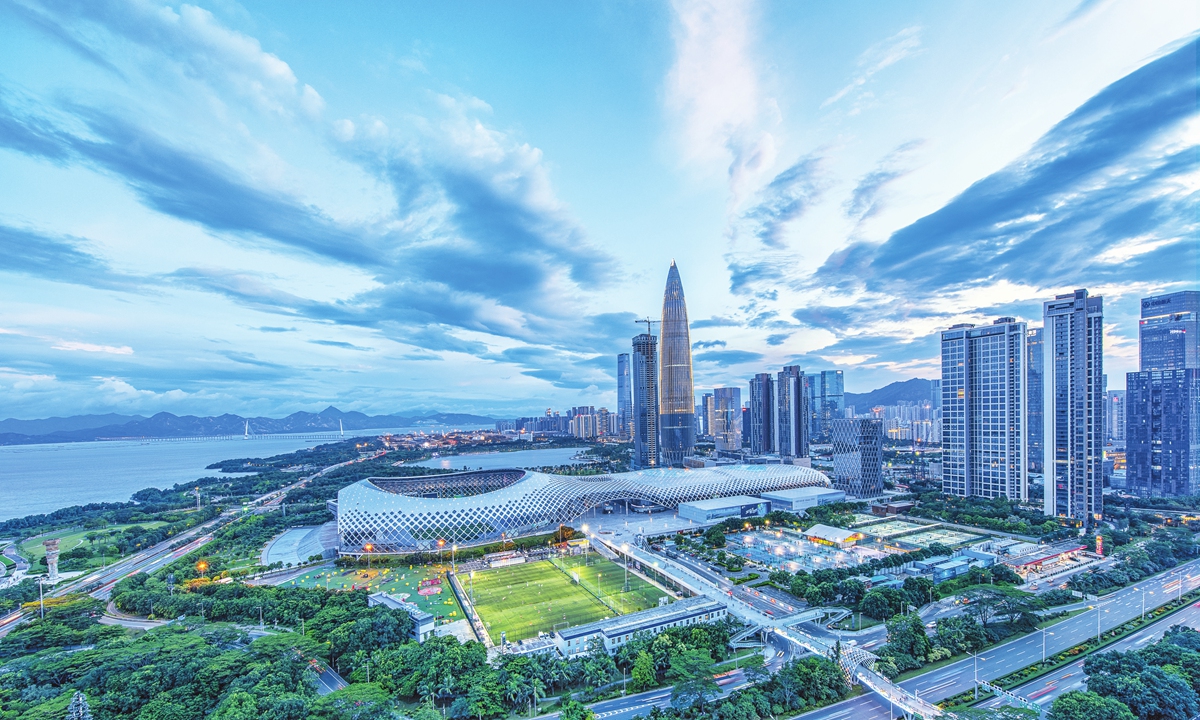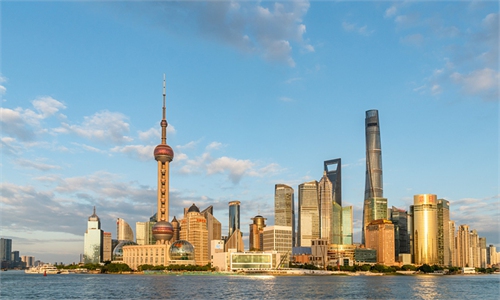China maintains state policy of opening-up, welcomes US cooperation, Premier Li Qiang says in first press conference
Stance injects strong impetus into global economic recovery at time of uncertainties: experts

Shenzhen Photo: VCG
During the press conference, he reiterated China's stance of welcoming cooperation with the US, saying that the two countries' economies are closely intertwined, and that crackdowns do no good for either side.
The routine press conference is always one of the main events during the two sessions that gets the most publicity, as it offers insights into how the Chinese government approaches social and economic issues of the most concern. This year, Premier Li touched on a wide range of topics from employment and agriculture to China-US relations and the private economy.
Li particularly stressed that China will maintain its opening-up policy and welcome investors from all over the world.
"Opening-up is a basic state policy for China. No matter how the external situation may evolve, we will stay firmly committed to pursuing this policy," he said, adding that the country will further expand opening-up in alignment with high-standard trade rules this year, and China will only open itself wider to the world.
Li also stressed that most foreign companies are optimistic about their development prospects in China and have backed this argument with numbers. According to Li, China utilized foreign investment totaling $189 billion last year, which was about $50 billion more than three years earlier.
"This demonstrates that China remains a popular destination for global investment," he said.
Experts praised China's persistent call for openness as helping to boost confidence in global economic development and inject strong impetus into the global recovery at a time when economic fluctuations and uncertainties are still increasing across the globe.
In the latest such crisis, US-based Silicon Valley Bank collapsed on Friday, the second-largest bank failure in US history, sending shockwaves through global financial markets.
"As the world's second-largest economy and the world's largest manufacturing country, China plays an important role in stabilizing the global industrial and supply chains and boosting confidence in economic recovery. An open China will provide broad development space for global investors," Zhou Maohua, an economist at Everbright Bank, told the Global Times on Monday.
Chen Jia, a macroeconomic observer, also told the Global Times that China's repeated stress on opening-up is based on a pragmatic attitude and the original intention of actively strengthening global governance.
According to Chen, the decoupling measures caused by anti-globalization and unilateralism have led to numerous bottlenecks on global supply chains, while most US allies have also experienced local currency crises and serious trade deficits, which shows that decoupling does no good to the global economy.
Economists predicted that China will push the progress of the Comprehensive and Progressive Agreement for Trans-Pacific Partnership (CPTPP), which China applied to enter last year.
"It is expected that China will start negotiating with the members this year, and will align its domestic economic and trade rules in accordance with the CPTPP," Tian Yun, a veteran macroeconomic observer, told the Global Times on Monday.
Besides vowing to continue opening-up, Premier Li also commented on the China-US relations, saying that he knows some people in the US have been trumpeting the idea of decoupling from China, and it's sometimes a hot topic in the media.
"But I wonder how many people can truly benefit from this kind of hype," he questioned, stressing that China and the US are "closely intertwined" economically, and have both benefited from the other side's development.
Li in particular noted that he had worked in Shanghai and had many opportunities to talk with senior managers of multinational corporations, including those from the US. He learned that they all believe cooperation is a short path to a win-win outcome.
"All this demonstrates that China and the US can and must cooperate," Li said, adding that there's a lot that the two countries can achieve by working together.
China-US trade rose by about 0.6 percent to $759 billion last year, customs data showed.
The world's two largest economies have engaged in lengthy political wrangling that shows no sign of abating, despite occasional thaws in their diplomatic relations. The Biden administration also continued its crackdown on China's high-tech industries this year by tightening controls on chip exports to China and roping in allies against China's chip supply chains.
Tian nevertheless stressed that with China's economic rebound and the many economic problems in the US, China should be in a better position than last year to cope with external challenges, including relations with the US.
"China's response or countermeasures to the crackdown by the US were restrained by the country's economic slowdown and epidemic fight last year. But this year, I figure the US' needs for Chinese markets will rise with China's economic rebound and the gathering US economic crises," he said.
Chen also said that the Biden administration should seize the opportunity of China launching institutional reforms to further promote normalization of China-US economic and trade relations, which he said will help to calm the turbulence of US financial markets and bring benefits to US people.

